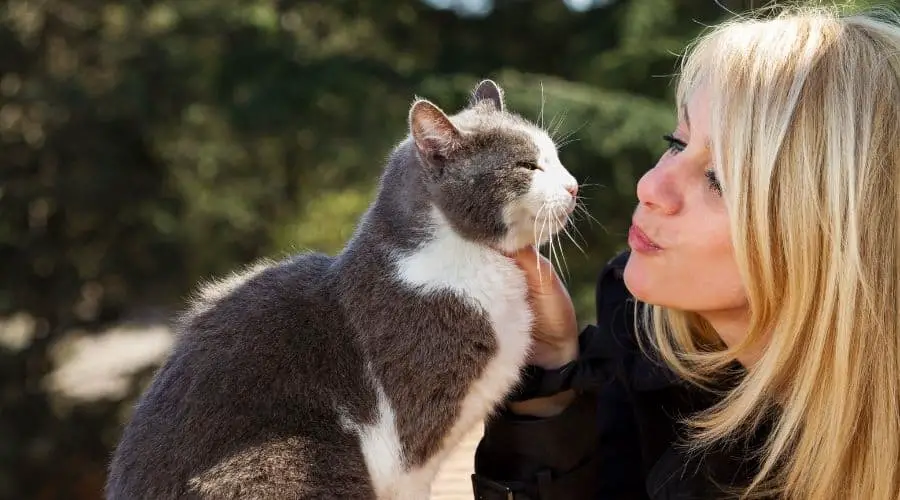Cats have learned to respond to humans by meowing, which they don’t do with other cats, but they also learned to listen.
Noises we make such as clicking our tongues, kissy sounds, handclaps, and other distinctly human nonverbal communications are powerful tools to use with your pet. Why do cats respond to kissing noises?
Cats respond to kissing noises because people have taught them that this noise has a meaning. Your cat is programmed to respond to high pitched sounds because in nature it often signals a meal. Your cat actively works to understand the significance of your communication because they want your attention.
Table of Contents
Why Do Kissing Noises Attract Cats
Kissing noises attract cats because the humans who make that noise use it to signal something desirable. Think about what happens when you make kisses at your kitty, and they run to you.
Most pet owners will talk to the cat, give it a scratch or a pat, or even use kiss sounds to tell them food or treats are about to arrive.
Just like your cat can learn what ‘no’ or ‘get down’ means, they learned the kiss you make at them because you trained them to understand the sound.
To your cat, that sound is just another word in your shared language, the same as its name. The cat wants what you offer with the kissing noise, so it’s attractive to them.
When your cat hears this sound, their brain tells them they are about to do or get whatever you taught them that noise means if they respond the way you expect.
This can mean coming to you, jumping into your lap, going to their food bowl, or anything else the cat might want. The response is Pavlovian.
As BBC Radio 4 explains it, “Pavlov carried out a series of experiments in which he played a sound, such as a buzzer, a harmonium or a metronome, whenever the dogs were given food. In each case, he found that the dogs began to unconsciously connect the new noise with eating and so started to salivate as soon as they heard it, even when food wasn’t present.”
In short, the dogs learned the sound meant food, and your cat has learned the kiss means getting petted, or some other rewarding activity is about to happen.
You may not have intended to teach them this, but it results from your interactions regardless. This trick, intentional or not, also works on other animals and people.
The sound matters less than the reward as long as both are reasonably consistent. However, just as Pavlov’s dogs, when you remove the prize, the learned response remains.
Why Do Cats Like Kissing Noises
Your cat hears the high pitch of your kiss noises well because high pitched sounds in nature often signal an excellent meal. Birds tend to be high-pitched as well, and they are a favorite feline snack.
However, this doesn’t mean your cat plans to eat you, but rather that they are good at hearing in that range, so it’s great for communicating with them.
1 – Kisses Mean Food
Numerous cat owners worldwide make kiss sounds to alert their pets to a meal. While some call their animals by name or say something generic like ‘here kitty-kitty,’ others prefer that unique mouth sound.
If you call your cat to meals, it doesn’t matter whether you ring a dinner bell, speak in any language, or make a different noise; they learn the intent.
2 – Kisses Mean Affection
Instead of kissing to indicate a meal, some cat owners make the noise when they want to pet their furry feline friends. Since cats enjoy getting petted, they learn to come for this just like they do for food.
The strokes likely remind them of their mother’s grooming when they were small, and it feels nice.
Between nostalgia and enjoyment, anything that means they’ll get their love is a good sound. The response is how they show you that they do indeed want that thing you give them.
3 – Kisses Mean Attention
Some pet owners make kiss noises at their cats across the room without offering other communication. Meanwhile, others use a kiss sound as part of a conversation.
If you’ve never heard a cat’ talk back,’ then I recommend this adorable video. They choose to converse with us.
Why Do Cats Hate Kissing Sounds
Cats only ‘hate’ kissing sounds when they are close to them. You have probably seen people get clawed for trying to kiss a kitty because it happens often.
Felines don’t mind kissing sounds, but they dislike the actual kissing.
1 – Kissing Doesn’t Make Sense To Cats
Cats don’t show affection the way we do. When a cat wants to show their love, they cuddle or give you a head butt.
A few licks to clean you or body language from the tail can be loving to them. Even turning their back on you is a sign of trust.
However, the ultimate love from your kitty is when they look at you and slowly blink their eyes to show they know you won’t hurt them even if they can’t see you.
Doing that is like a love note or a blown kiss from your pet.
2 – Getting Close To The Face Is (Usually) Too Intimate
Putting your mouth near a cat often feels like a threat to them because it would be a threat from any other animal.
While they can learn to understand the sound as a call to dinner or sign you want to offer them affection, the noise is not the same as putting your mouth on them. Humans are larger predators than housecats, and we could eat them.
A few rare cats tolerate kisses on top of their head or may even allow you to kiss their face, but that’s out of tolerance for our foreign (human) customs and a desire to please you and show trust.
3 – Human Breath Smells, Even When You Brush Your Teeth
Cats have much more powerful noses than we do. Your pet’s nose has over two hundred million odor sensors inside, while yours has a mere five million.
Cats can smell things we don’t even know have a scent, and while they aren’t as powerful as dogs’ noses, they’re still good enough to smell everything that’s been in your mouth anytime recently, regardless of tooth brushing.
Helpful Tips To Know About Why Cats Respond To Kissing Noises
Good or bad, most cats respond to kissing noises because they recognize the significance you assign to it unconsciously while interacting. If your cat shies away from kissing sounds, it’s probably because they don’t want to be kissed.
Here are more helpful tips to know about why cats respond to kissing noises.
- Kittens make high-pitched meows to call their mothers. Though a kiss isn’t a mew, your cat likely tunes in to the sound because high noises are how cats communicate with their young.
- Cats don’t meow at other adult cats. Instead, they reserve the noise for ‘talking’ to humans because we respond to it. We have learned how to understand some of their communication as well because humans react to meowing.
- According to Cat’s in the Box, “… a cat’s hearing is extremely sensitive. We hear noises in a range of 20-20,000 hertz. Cats can hear sounds from 45 to 60,000 hertz. That’s almost two octaves higher! Even though dogs are known for being able to hear a high-pitched “dog whistle,” cats can actually hear higher frequencies than dogs.”
Final Thoughts
When your cat responds to the kissing sounds, you make they are doing so because you have both unknowingly agreed on what that sound means.
Your pet wants whatever you give them along with that noise, even if it’s just some attention. As a result, they reply in the way you expect.
For some, that means coming running, while others may head right to the food bowl because not all humans use the sound to mean the same thing for their pets.
Kissing sounds are nonverbal communication despite the fact we don’t usually think of it that way.


